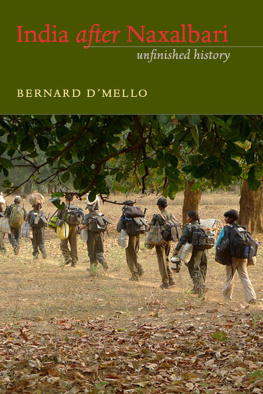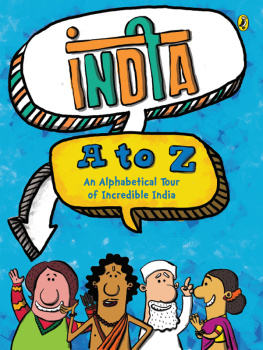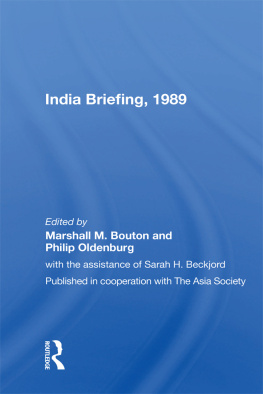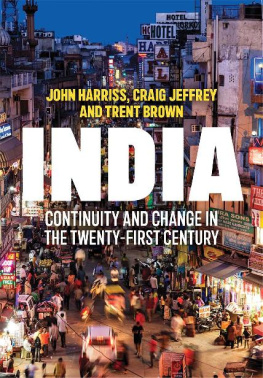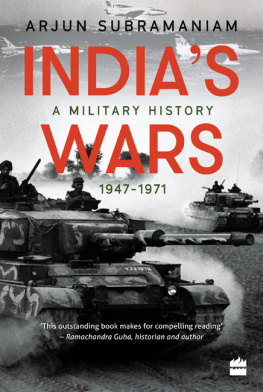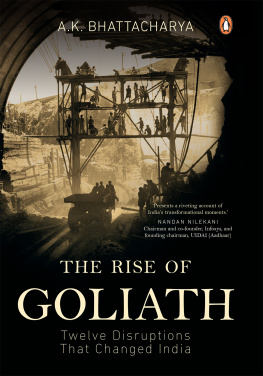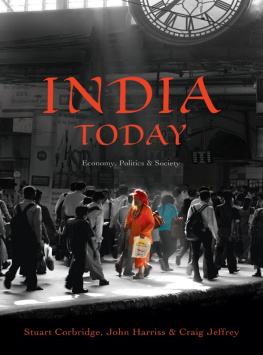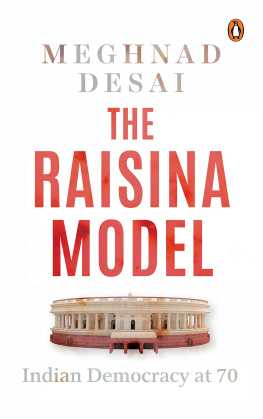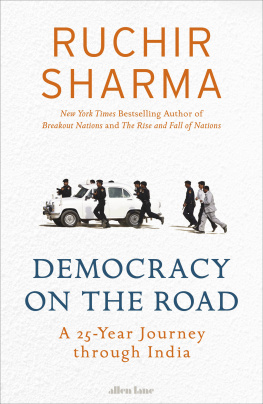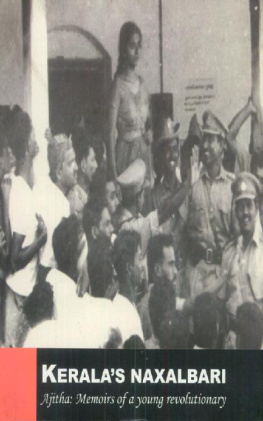
INDIA AFTER NAXALBARI
INDIA AFTER NAXALBARI
Unfinished History
Bernard DMello

MONTHLY REVIEW PRESS
New York
Copyright 2018 by Bernard DMello
All Rights Reserved
Library of Congress Cataloging-in-Publication Data
available from the publisher
ISBN: 978-158367-706-3 (paper)
ISBN: 978-158367-707-0 (cloth)
MONTHLY REVIEW PRESS, NEW YORK
monthlyreview.org
Typeset in Minion Pro
5 4 3 2 1
Contents
Dedicated to the memory of
ANURADHA GHANDY (19542008)
She led the struggle for bread and roses, the fight for a richer and fuller life for all
NIRMAL KUMAR CHANDRA (19362014)
One of Indias finest radical economists, whose aspirations lay beyond the limits of acceptable scholarship
P. A. SEBASTIAN (19382015)
Indefatigable lawyercrusader for democratic rights, pioneer of Russell Tribunals in India
Acknowledgments
As I write these words of gratitude, I am filled with sadness upon hearing about the passing away of comrade Vikas (Arvind was his other alias), a politburo member of the Communist Party of India (Maoist). In the mid-1980s, as a journalist associated with the Kolkata-based radical-left weekly, Frontier, on a visit to the countryside of the district of Gaya in the State of Bihar, I first met Vikas, who was then a prominent leader of the Mazdoor Kisan Sangram Samiti (workerpeasant militant struggle association), and the Communist Party of India (MarxistLeninist) (Party Unity), one of the predecessors of the CPI (Maoist). Vikas related to the poor and landless peasants in an utterly egalitarian and democratic manner; he seemed to have earned their affection, loyalty, and respect by his deeds.
On this trip, when I was leaving a village on my way to the next one, an elderly man under the care of his grandson insisted on accompanying us (me, a Frontier companion, and our local guide) right to the outskirts of his village. When the time came to say our goodbyes and Lal Salaams (Red Salutes), I told him that he should not have taken all this effort to come so far with us. To which he replied: You have come all the way from Kolkata to learn about us, our lives, our struggles, and our concerns. You care about us.
I never forgot Vikas or what this peasant-comrade told me, and was inspired, much later, when I felt adequately intellectually equipped, to write the essay What Is Maoism?. And now, Ive penned this book. Hundreds of millions of people have been the victims of Indian capitalisms irrationality, brutality, and inhumanity, and it is the actions of those who could not remain unmoved and were compelled to revolt that have motivated me to write this book. But as I write these words of a sense of obligation, I record with sorrow the death of Ashok Mitra, my favorite columnist, whose weekly columns, taken together, constitute what I have called a Guernica of political prose, so full of life, of anger and indignation, as well as empathy and compassion. He had given me some sound advice on finishing what I had begun, this book, and looked forward to the end product, but now hes no more.
The New York-based independent socialist magazine, Monthly Review has, over the years, been an essential part of my education, and its wonderful that Monthly Review Press is publishing this book. The Marxist intellectual underworld in India has proved to be one of the best circles for my political educationSamar Sen, Timir Basu, P. A. Sebastian, Sumanta Banerjee, C. V. Subba Rao, K. Balagopal, Tilak Dasgupta, Ajit Roy, Sudesh Vaid, Gautam Navlakha, and Rajani X. Desai come to mind at first thought. Besides the ones I mention, there have also been left-party activists, feminists, ecologists, Dalits, oppressed nationalists, democratic rights campaigners, and pacifists, from whose insights, probing questions, and criticism I have learned a great deal. I was very fond of my thesis supervisor, the radical economist Nirmal Kumar Chandra, who later became a good friend and encouraged me on the unconventional path I took, which has eventually led to this book. And, I cannot forget my first editor, Samar Sen (Shmor babu), founder-editor of Frontier, celebrated post-Tagorean Bengali poet, who encouraged me to widen my intellectual repertoire.
Initial versions of what became were presented as part of the first Randhir Singh memorial lecture I was invited to deliver at New Delhi in January 2017.
a lot easier than it would otherwise have been.
I thank Subhas Aikat of the Kharagpur-based Cornerstone Publications; Rajani Desai and Girish Srinivasan of the Mumbai-based Research Unit for Political Economy; Alpa Shah, Swapna Banerjee-Guha, Ajmal Khan, and Arup Sen for readily responding to my requests to locate and send me certain essential books and papers. The construction of the maps I owe to my EPW colleague, Abhishek Shaw, and I am grateful to him for devoting precious hours to the task. For the photograph of Maoist guerrillas on the march that graces the books cover, Monthly Review Press and I are obligated to the well-known documentary filmmaker Sanjay Kak.
The writing of this book put an unintended additional load on my EPW colleagues, for I was on leave from my job for a year and a half. I express my sense of obligation to them.
I am grateful to John Mage for reading a first draft of the entire manuscript. His classical approach to Marxist analyses, his queries, his pointing me to errors, his encouragement. John, I needed the kind of gentle assurance and guidance you provided with regard to my ways of looking at and thinking about the subject matter of this book. Uma and Anand Chakravartis helpful comments on a draft of the Appendix on Caste were valuable. Swapna Banerjee-Guhas reactions to a draft of have enriched both form and content. Michael D. Yates, Director, Monthly Review Press, read the entire manuscript after it had been copy-edited, and helpfully pointed to transatlantic differences with regard to commas and much else that both Stephen and I had overlooked. Michaels words, I enjoyed reading your book and learned a great deal from it, mean a lot to me. Thank you, Michael.
I must record a big thank-you to Martin Paddio and Susie Day at Monthly Review Press; and to K. K. Saxena, publisher, Aakar Books, Delhi; for all it takes to reach out to readers and keep the enterprise going.
Finally, words would never suffice to express my gratitude to ma and pa, Jean Florence Abrahams and Charles Francis DMello, working-class parents who raised me; to Pauline Menezes, my partner, who has stood by me through my darkest nights, kept me from the brink of the abyss. And, to our son Samar and daughter Vera, I am now in debt to the tune of five holidays in the hills and by the riverside.
BERNARD DMELLO
Mumbai, May 1, 2018
Introduction
A longside China, India has been hailed as one of the worlds most significant emerging economies/markets. But one might well ask: in what way has India been emerging? Open to the expansion of Northern multinational capital that is driven to exploit global labor arbitrage opportunities? Open to international financial capital in its perennial hunt for capital gains? Unlike India, it is China, with huge current account surpluses on its balance of payments, deriving mainly from export of manufactured goods, which has proved capable of setting the terms of its economic openness and successfully directing the accumulation process to its own national development. While China has been open to capital exploiting the global labor arbitrage opportunity it offers in the production of manufactured goods for export to Northern markets, India has been offering the same in Information Technology (IT)-enabled services. Indias international competitiveness in ITenabled services derives from the fact that the value created by its IT workers is a multiple of what they are paid, and much of the surplus value is captured through exchange by the Northern clients of the Indian ITenabled service-providing firms.
Next page
